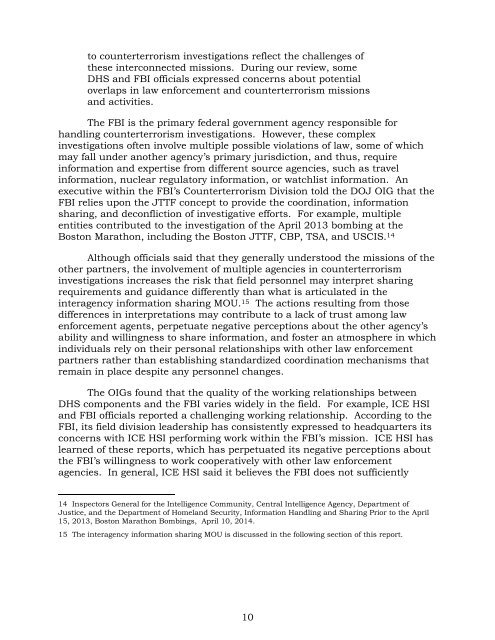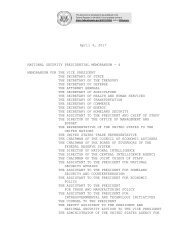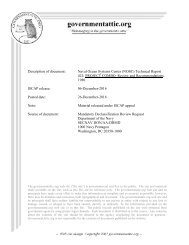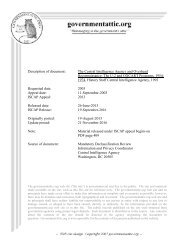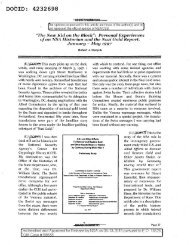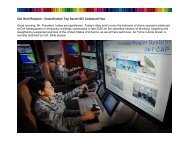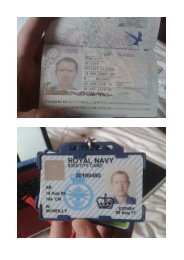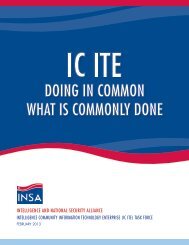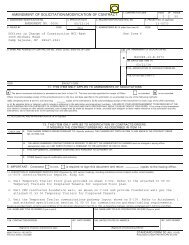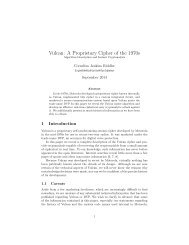Review of Domestic Sharing of Counterterrorism Information
Domestic_Sharing_Counterterrorism_Information_Report
Domestic_Sharing_Counterterrorism_Information_Report
You also want an ePaper? Increase the reach of your titles
YUMPU automatically turns print PDFs into web optimized ePapers that Google loves.
to counterterrorism investigations reflect the challenges <strong>of</strong><br />
these interconnected missions. During our review, some<br />
DHS and FBI <strong>of</strong>ficials expressed concerns about potential<br />
overlaps in law enforcement and counterterrorism missions<br />
and activities.<br />
The FBI is the primary federal government agency responsible for<br />
handling counterterrorism investigations. However, these complex<br />
investigations <strong>of</strong>ten involve multiple possible violations <strong>of</strong> law, some <strong>of</strong> which<br />
may fall under another agency’s primary jurisdiction, and thus, require<br />
information and expertise from different source agencies, such as travel<br />
information, nuclear regulatory information, or watchlist information. An<br />
executive within the FBI’s <strong>Counterterrorism</strong> Division told the DOJ OIG that the<br />
FBI relies upon the JTTF concept to provide the coordination, information<br />
sharing, and deconfliction <strong>of</strong> investigative efforts. For example, multiple<br />
entities contributed to the investigation <strong>of</strong> the April 2013 bombing at the<br />
Boston Marathon, including the Boston JTTF, CBP, TSA, and USCIS. 14<br />
Although <strong>of</strong>ficials said that they generally understood the missions <strong>of</strong> the<br />
other partners, the involvement <strong>of</strong> multiple agencies in counterterrorism<br />
investigations increases the risk that field personnel may interpret sharing<br />
requirements and guidance differently than what is articulated in the<br />
interagency information sharing MOU. 15 The actions resulting from those<br />
differences in interpretations may contribute to a lack <strong>of</strong> trust among law<br />
enforcement agents, perpetuate negative perceptions about the other agency’s<br />
ability and willingness to share information, and foster an atmosphere in which<br />
individuals rely on their personal relationships with other law enforcement<br />
partners rather than establishing standardized coordination mechanisms that<br />
remain in place despite any personnel changes.<br />
The OIGs found that the quality <strong>of</strong> the working relationships between<br />
DHS components and the FBI varies widely in the field. For example, ICE HSI<br />
and FBI <strong>of</strong>ficials reported a challenging working relationship. According to the<br />
FBI, its field division leadership has consistently expressed to headquarters its<br />
concerns with ICE HSI performing work within the FBI’s mission. ICE HSI has<br />
learned <strong>of</strong> these reports, which has perpetuated its negative perceptions about<br />
the FBI’s willingness to work cooperatively with other law enforcement<br />
agencies. In general, ICE HSI said it believes the FBI does not sufficiently<br />
14 Inspectors General for the Intelligence Community, Central Intelligence Agency, Department <strong>of</strong><br />
Justice, and the Department <strong>of</strong> Homeland Security, <strong>Information</strong> Handling and <strong>Sharing</strong> Prior to the April<br />
15, 2013, Boston Marathon Bombings, April 10, 2014.<br />
15 The interagency information sharing MOU is discussed in the following section <strong>of</strong> this report.<br />
10


